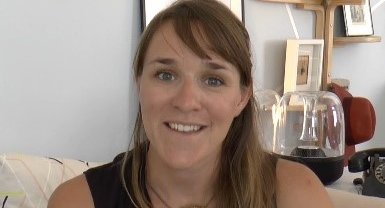Best female PhD students 2018 - Eline van der Kruk
Next Friday we celebrate the International Women’s Day. In the lead up to #IWD2019, we'll be posting profiles of our 2018 Cum Laude female PhD candidates on our Twitter account. The best female PhD student at TU Delft for 2018 will be awarded at our annual DEWIS symposium on 4 March. With this award, DEWIS rewards the quality of the PhDs dissertation and places her extraordinary achievement in the spotlights. #IWD2019 #BalanceforBetter.

‘Hi, my name is Eline van der Kruk and I did my PhD at the faculty of Mechanical, Maritime and Materials Engineering at the Department of BioMechanical Engineering. I have a Bachelor’s degree in Industrial Design Engineering and a Master’s degree is in Mechanical Engineering.’
What was your PhD research about? Why is this important?
‘The aim of my PhD project was to improve the performance of speed skaters by providing real-time feedback during skating. This project was a collaboration with the Dutch national long-track and short-track speed skating team. Although speed skating has existed for centuries, it was not yet clear what the optimal skating technique actually is. Skating is a motion with many interconnected variables, and there seem to be different optimal techniques for different speed skaters. Therefore, we developed computer models based on dynamics to simulate and optimize the speed skating motion. Also, we developed real-time feedback systems, such as instrumented (klap)skates to measure the movements of the skaters and provided them with real-time feedback via a smart glass.’
What did you find attractive about your research?
‘As a student, I was inspired by the story of a Chinese researcher who developed a physics model to predict that, opposite to everyone’s convictions, a certain gymnastics exercise should be feasible, and thereby made an athlete win the Olympics. Ever since, I knew I wanted to use dynamic models to predict and improve human motion, both in sports and in restoring impaired movement. This PhD research gave me the opportunity to develop these models for the Dutch national speed skating team. I was attracted by the chance to directly work with elite athletes. When you develop for the very best, you need to work on the cutting-edge of technology, and I like a challenge. The combination of theoretical (fundamental) research combined with direct application and implementation is what attracts me in a project.’
What were the obstacles and difficulties? How did you tackle them?
‘Oh yes, several, as any PhD student will tell you. My two main challenges were to convince the elite skaters and their coaches of the benefit of participating in research (even if there were no direct results) and to perform measurements on an ice rink (rather than the controlled environment of a lab). These two challenges came together when I wanted to measure the 3D movements and push-off forces of the skaters on the ice. Eventually it turned out to become one of the biggest accomplishments of my PhD research. During four overnight measurements at Thialf, we captured the 3D movements and push-off forces of several national and Olympic speed skaters using self-made instrumented klapskates and special 3D motion capture cameras. It took over a year to set-up the experiment and 15 people (out of three countries) to help me out during these measurements to accomplish this. It was the largest volume measured in 3D human motion capture so far. We therefore had a unique dataset. But as with anything in research, the next challenge was not far ahead. When analysing the data it turned out that we lost part of this dataset due to a mis production in the purchased USB drives on which we had saved and back-upped our data. This was the biggest set-back of my PhD. Luckily, we found a way to work around the missing data, and we gathered enough data to find answers to the research questions. I feel that the main skill you gain during a PhD project is tackling obstacles and dealing with set-backs.’
What was your next step? What are you doing now?
‘My aspiration is to establish a human performance lab focussed on optimization of human movement in both sports and daily life, for anyone. But I am not there yet. After my PhD, I applied for a NWO Rubicon grant, which allows researchers to gain experience at a university outside of the Netherlands. I applied to go to Imperial College London, to use predictive simulations to predict mobility impairments in elderly people. After some wanderings while waiting for the results of the grant application, I moved to London a couple of months ago. Here I now analyse how the decline in our muscles, bones, and neurological system due to ageing results in movement limitations and how we can prevent these mobility impairments. In this research I collaborate directly with elderly people and clinicians in hospitals and nursing homes. So again, my project has both the fundamental side and the direct application side. Apart from exploring London and starting up this new research, I am passioned to share my enthusiasm for engineering and science, so I started vlogging, first for NWO, and now via our own channel ‘Scenes behind Science’. Here you can find out whether I manage to establish my vision! ‘
Read all the interviews with all female Cum Laude PhD students of 2017-2018 here.